|
|
|
Sort Order |
|
|
|
Items / Page
|
|
|
|
|
|
|
| Srl | Item |
| 1 |
ID:
145626


|
|
|
|
|
| Summary/Abstract |
Two decades later, how should we conceptualize the relevance of the Oslo Accords today? This article reconstitutes our understanding of the Accords through three parameters and purports that the legacy of the Interim Agreement is one that oscillates between what it has failed to achieve with regard to the Palestinian quest for statehood and what it continues to do as a mechanism influencing the “brand” Palestinian politics that can be practiced (uninhibitedly) within the occupied Palestinian territories (oPt). In this way, charting the path for future research, this article concludes that any subsequent studies on Palestinian politics and political behavior would need to account for both what the Accords has not done and what it continues to do.
|
|
|
|
|
|
|
|
|
|
|
|
|
|
|
|
| 2 |
ID:
148603
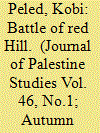

|
|
|
|
|
| Summary/Abstract |
This article explores the relations between inhabitants of the Upper Galilee village of Mi'ilya and soldiers of the Arab Salvation Army (ASA) in the months leading up to the conquest of the village in October 1948. Using interviews conducted in Arabic with surviving elders from Mi'ilya as well as contemporaneous Hebrew documents preserved in the archives of the Israeli army, the article aims to construct an integrated historical narrative of events. Throwing light on little-known figures of the ASA, the study uncovers the complex web of relationships that emerged in the day-to-day interactions of the ASA volunteers with the Palestinian villagers they were sent to defend. Particular emphasis is placed on the battle of Red Hill, now mostly forgotten, which took place almost three weeks before the fall of the village, mobilizing ASA troops, members of the local militia, and residents of Mi'liya in a joint effort to fend off encroaching Israeli forces.
|
|
|
|
|
|
|
|
|
|
|
|
|
|
|
|
| 3 |
ID:
141511
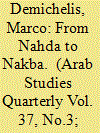

|
|
|
|
|
| Summary/Abstract |
The Governmental Arab College of Jerusalem is a little-known constructed space that emerged and then disappeared in just a few decades, a remarkable while extremely limited time if we reflect on the ancient history of the town that hosted it. However, it would be a great mistake not to consider these 30 years of history, from 1918 to 1948, and especially the wealth of cultural consciousness that the College was able to instill in its students. Ihsan Abbas (1920–2003), Ismail Ragib Khalidi (1916–1968), ‘Abdul Latif Tibawi (1910–1981), Irfan Shahid (1926) as academics, and Haidar Abdel Shafi (1919–2007), Halil-Salim Jabara (1913–1999), Hasib Sabbagh (1920–2010) etc. as politicians and activists are some of the most important names in Arab Palestinian culture and politics of the twentieth century, and all of them studied at the Arab College of Jerusalem. In this article, I would like to focus attention on the importance of this secondary/preparatory school, the social and cultural values that the teaching body was able to impart, and the role it played within the increasing and violent debate that the Arab College ignited concerning the growing Arab Palestinian-Jewish conflict in the first half of the twentieth century under the British Mandate. The Palestinian intelligentsia that was shaped within the Arab College symbolizes a cultural elite that, even if it would learn what it means to live as refugees, continued to work in different ways on its own cultural tradition. A key subject in understanding the main reasons behind the roots of identity within this divided city.
|
|
|
|
|
|
|
|
|
|
|
|
|
|
|
|
| 4 |
ID:
146414
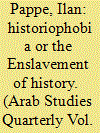

|
|
|
|
|
| Summary/Abstract |
This article examines closely the role of the 1948 Palestinian catastrophe in the contemporary peace process. It argues that peace mediation in the conflict regarded history in general an obstacle for progress and the Palestinian victimization in 1948 as a marginal and irrelevant issue. This peace process, which ignored the ethnic cleansing of Palestine in 1948 and its impact on the contemporary reality, failed dismally. The article argues that only a courageous encounter with the crime committed in 1948 and an authentic search for rectifying it through restitutive justice, and not retribution, can open up a genuine process of reconciliation in Palestine.
|
|
|
|
|
|
|
|
|
|
|
|
|
|
|
|
| 5 |
ID:
170905


|
|
|
|
|
| Summary/Abstract |
The link between the Holocaust and the Nakba is probably the most charged for both Jews and Palestinians. To Jews, the Holocaust is a foundational past, and some would say a unique one, and thus to discuss it in conjunction with any other event may appear to banalize the extermination of the Jews and even to present a moral and political threat. To Palestinians, the Nakba is a foundational past, and since the Jews invoke the Holocaust to justify Zionism and Israel’s actions, to many Palestinians recognition of the Holocaust is tantamount to legitimizing the injustices of the Nakba and the iniquities that Israel continues to wreak upon them. To Germans as well, the juxtaposition of these two events is a sensitive matter, since they feel particularly responsible for the memory of the Holocaust.
|
|
|
|
|
|
|
|
|
|
|
|
|
|
|
|
| 6 |
ID:
180230
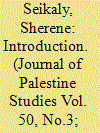

|
|
|
|
|
| Summary/Abstract |
Journal of Palestine Studies coeditor Sherene Seikaly introduces a cluster of essays by Sreemati Mitter, Alex Winder, Charles W. Anderson, and Haneen Naamneh that examines Palestinian “history from below.” The focus of these essays is on the everyday losses endured and the community-based forms of resistance enacted by ordinary Palestinians. Seikaly explains how, through the struggle against financial dispossession, the journey into insurgent law, broad-based collective civil disobedience, and Arab futurity in Jerusalem, these four essays make space for new understandings in the way we narrate Palestine, its history, and its people.
|
|
|
|
|
|
|
|
|
|
|
|
|
|
|
|
| 7 |
ID:
135690
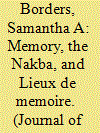

|
|
|
|
|
| Summary/Abstract |
When considering the element that make up a cultural identity, a keen sense of the personnel is vital. in looking back at the events that have tied a people together, memory plays an essential role in preserving a history. in the case of Palestinian Nakba, or the catastrophe, that consisted of the ethnic cleansing of some 800,000 Arab from the region of British Mandate Palestin, its commemoration act as more than a point of reference for these people. Whether in diaspora or on the land itself, the corporate suffering caused by this instance has become a pivot in modern Palestine identity.
|
|
|
|
|
|
|
|
|
|
|
|
|
|
|
|
| 8 |
ID:
108261
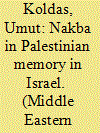

|
|
|
|
|
| Publication |
2011.
|
| Summary/Abstract |
Changes in the international, regional and domestic arenas in the late 1990s resulted in discursive change with regard to interpretation of the Al Nakba in the political and civil societies of the Palestinian Arab citizens of Israel. Apart from fuelling a discursive challenge to the Israeli dominant discourse about the 1948 events, this reinterpretation allowed the Palestinian Arab citizens to discuss the historical roots of the problems they experienced within the Israeli political and civil societal spheres. This article analyses the nature and significance of discursive change of the Palestinian Arab citizens of Israel on the Nakba by referring to its impact on their identity politics as well as their political and civil societal activities.
|
|
|
|
|
|
|
|
|
|
|
|
|
|
|
|
| 9 |
ID:
180234
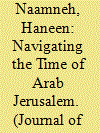

|
|
|
|
|
| Summary/Abstract |
For many Palestinians, the colonial denial of Palestinian self-determination in an independent nation-state has rendered futile the very notion of a future. But it is imperative to challenge the colonial logics that produce the native’s future as always already failed, unachievable, or impossible. This essay examines snippets of the life of Arab Jerusalem between the two major ruptures of 1948 and 1967 to deconstruct colonial and nationalist epistemologies of time and to challenge the persistently violent present and its domination of Palestinian pasts and futures. Using as its lens the memories and attachments of Jerusalemites who lived, worked, and struggled in the city, the essay examines the ways in which they thought of, imagined, produced, fulfilled, or were deprived of a future—in other words, how Jerusalemites shaped futurity. Such a nonlinear unfolding of time challenges dominant perceptions of the Nakba as constituting a clean break between past and present.
|
|
|
|
|
|
|
|
|
|
|
|
|
|
|
|
| 10 |
ID:
130740
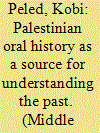

|
|
|
|
|
| Publication |
2014.
|
| Summary/Abstract |
The purpose of this article is to further explore the potential for Palestinian oral history to be used as a source for understanding the past. It examines existing directions in this field and highlights new approaches based on a discussion of an oral history project conducted by the author of this paper - a Jewish Israeli - in the Upper Galilee between the years 2006 and 2011. The article sharply illustrates the necessity and the urgency of recording Palestinian oral history with regard to the period that preceded the 1948 war, especially where written sources are lacking. It demonstrates the richness of oral history among Palestinians in Israel and exemplifies its ability to capture a vivid picture of a segment of Palestinian rural life before the Nakba. Methodologically, the article emphasizes the significance of cross-checking non-dependent oral sources as well as cross-checking oral sources against written testimonies as a means of striving for the truth and as a useful way of examining the reliability of oral sources.
|
|
|
|
|
|
|
|
|
|
|
|
|
|
|
|
| 11 |
ID:
128169
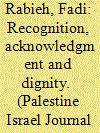

|
|
|
|
|
| Publication |
2012.
|
| Summary/Abstract |
We have no choice but to learn how to coexist and share this land; we cannot defeat each other militarily and that each nation is here to stay.
|
|
|
|
|
|
|
|
|
|
|
|
|
|
|
|
| 12 |
ID:
190013
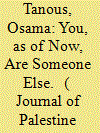

|
|
|
|
|
| Summary/Abstract |
This article challenges the dominant notion that the health of Palestinians inside the Green Line can be framed or understood as an issue of “minority health” characterized by a “gap” that needs bridging in order for health equity to be attained. It situates the health of Palestinians in Israel within the realm of Indigenous health and claims that the settler-colonial nature of the state of Israel, the minoritization of Palestinians, and their depeasantization through land policies and water infrastructures have produced an Indigenous community alienated from its lands and from nature. These processes, I argue, contribute to adverse health outcomes that are then reported simply as “minority health” phenomena, chalked up to behavioral patterns or biology. The article seeks to challenge the entire notion of “minority health” as a purportedly neutral statistical unit and to launch a conversation on the health effects of minoritization in settler-colonial contexts.
|
|
|
|
|
|
|
|
|
|
|
|
|
|
|
|
|
|
|
|
|